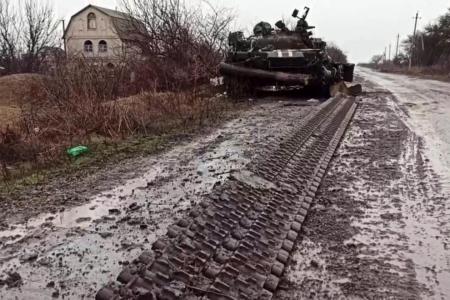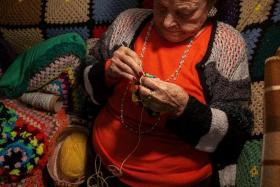Russia announces temporary ceasefire in 2 Ukrainian cities to allow evacuations
KYIV (AFP/REUTERS) - Russia's defence ministry announced a temporary ceasefire from 10am Moscow time (3pm Singapore time) on Saturday (March 5) to allow humanitarian corridors out of the Ukrainian cities of Mariupol and Volnovakha, the Interfax news agency reported.
The ministry said this would allow residents of the two cities to evacuate.
“Today, March 5, from 10am Moscow time, the Russian side declares a regime of silence and opens humanitarian corridors for the exit of civilians from Mariupol and Volnovakha,” the ministry said.
Civilians will be allowed to leave Mariupol between noon and 5pm Moscow time on Saturday, Russia’s RIA news agency cited city authorities as saying.
The Russian defence ministry clarified that the location of the humanitarian corridors and exit points had been determined in agreement with the Ukrainian authorities, according to Russian news agencies.
Mariupol mayor Vadim Boychenko said the city’s government had been informed of the ceasefire agreement around half an hour before it was scheduled to begin, and that officials were making plans to bring in medicine and other essential supplies.
He said a ceasefire would allow for work to be done to restore critical infrastructure destroyed by Russian shelling.
Mr Boychenko had earlier said Russian troops had blockaded the strategic port city.
While laying siege to Mariupol for days, Russian forces also cut its electricity, food, water, heating and transportation in winter, prompting comparisons to the Nazi blockade of Leningrad (now Saint Petersburg) in World War II.
"For now, we are looking for solutions to humanitarian problems and all possible ways to get Mariupol out of the blockade," Mr Boychenko had said ahead of the Russian defence ministry's announcement. He had also called for a ceasefire and a humanitarian corridor for food and medicine.
Since President Vladimir Putin's army invaded on Feb 24, Russia has pummelled Ukrainian cities, killed hundreds of civilians and attacked Europe's largest atomic power plant.
The invasion has drawn condemnation and severe sanctions from Western nations balancing punishment of the Kremlin with fears of a hazardous escalation.
Moscow has seized two key cities in its 10-day-long invasion, Berdiansk and Kherson on Ukraine's southern Black Sea coast.
But capturing Mariupol, a city of about 450,000 people on the Azov Sea, would represent a bigger prize for Russian forces as it would deal a severe blow to Ukraine's maritime access and connect troops coming from occupied Crimea and the Donbas region.
Kremlin spokesman Dmitry Peskov said late on Friday that Moscow was waiting for a third round of talks with Ukraine in Belarus, and one of Kyiv's negotiators said it hoped to hold them this weekend.
"The third leg could take place tomorrow or the day after, we are in constant contact," Ukrainian presidential adviser Mykhailo Podolyak said on Friday.
Ukrainian President Volodymyr Zelensky was set to appeal to Washington for more assistance. He was to address the US Senate as some lawmakers urged President Joe Biden to take tougher measures, including banning Russia's oil imports.
Mr Zelensky had earlier criticised Nato for ruling out a no-fly zone, saying the Western military alliance had essentially given "the green light for further bombing of Ukrainian cities and villages".
In the northern city Chernihiv, 47 people died on Thursday when Russian forces bombed residential areas, including schools and a high-rise apartment block, according to local officials.
"We are faced together with what is President Putin's war of choice, unprovoked, unjustified, and a war that is having horrific, horrific consequences," US Secretary of State Antony Blinken said in Brussels. "We're committed to doing everything we can to make it stop."
Mr Putin on Friday told his Belarusian counterpart Alexander Lukashenko that "the tasks set for the (Ukraine) operations are going according to plan and will be fulfilled in their entirety".
With fears growing of nuclear conflict, the US and Russian armed forces have set up a new direct phone line to reduce the risks of "miscalculation", the Pentagon said on Friday.
Russian forces attacked and seized the Zaporizhzhia nuclear plant on Friday, with Kyiv accusing Moscow of "nuclear terror".
Ukrainian monitors say there has been no spike in radiation after a fire in a training facility.
Moscow denied it had shelled the plant.
Russian authorities have imposed a news blackout and several media outlets have halted operations in the country.
Multiple media websites, including the BBC, were partially inaccessible in Russia.
Twitter was restricted and Facebook blocked.
The BBC and Bloomberg said they were suspending work in Russia after lawmakers in Moscow approved legislation to impose fines and jail terms of up to 15 years for anyone publishing "fake news" about the army.
CNN said it would halt broadcasting in Russia, while independent Russian newspaper Novaya Gazeta said it would remove Ukraine content in the wake of the new law.
The UN Security Council will hold an emergency meeting on Monday on the humanitarian crisis in Ukraine and discuss a possible draft resolution, diplomats told AFP on Friday.
The UN says more than 1.2 million refugees have flooded into neighbouring countries.
The global body's food agency has warned the conflict will create a food crisis in Ukraine and worsen global food insecurity, with Moscow and Kyiv providing around 29 per cent of the global wheat trade.
"The bullets and bombs in Ukraine could take the global hunger crisis to levels beyond anything we've seen before," said agency director David Beasley.
Follow The Straits Times' live coverage on the Ukraine crisis here.
Get The New Paper on your phone with the free TNP app. Download from the Apple App Store or Google Play Store now


